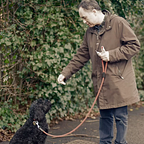What to Do If Your Dog Has Separation Anxiety
Seeing your dog get upset when you leave is almost just as traumatic for you as it is for your pup. Separation anxiety is common in dogs, and there are many reasons why it occurs. Rescued dogs may fear being left alone again, and young puppies might not understand that you’ll come back. Even dogs who are used to being alone may change their behavior in a new environment or when they are bored. Once you notice the signs of separation anxiety in your pet, you can start using these tips to help them stay calm.
Make Your Exits and Entrances Boring
Your dog looks to you for cues regarding what is happening, and body language is everything with canines. While it might feel fun to shower your pet with love before you leave, you might be sending the wrong message that you’re worried. Try using a basic command word that signals that you are leaving. The same goes for when you return. It’s perfectly okay to give your pup a few pets, but try to maintain a nonchalant demeanor that makes it clear that your arrivals and departures are just a normal part of the day.
Give Them a Comfort Object
If your pup engages in destructive behavior, then they may just be bored or trying to burn off energy from their anxiety. You can try keeping a special toy to give your dog only when you leave the house. Make sure it is safe for dogs and sturdy enough to survive the time you are away. Your dog might also enjoy having something with your scent such as an old shirt or blanket.
Create a Safe Space
Dogs who chew up furniture or scratch up the door may need to have a safe area where they can stay while you are gone. Keep in mind that your dog’s safe space should have enough room for them to move around. Once you’ve picked a space, add a dog bed, some toys and food, and water. Your dog will eventually come to like having a special area where they can go until you get home.
At some point, most dogs experience some degree of separation anxiety. Staying calm and responding to their needs will help them learn how to be okay with being alone for brief periods of time. Just keep trying new things, and your dog will eventually learn that you’ll always return.
Originally published at https://michaelwolkindqc.org.uk.
